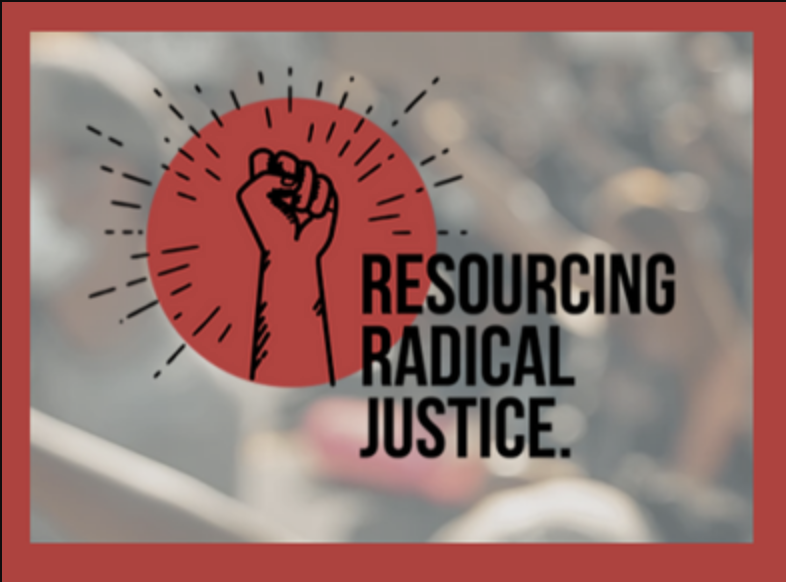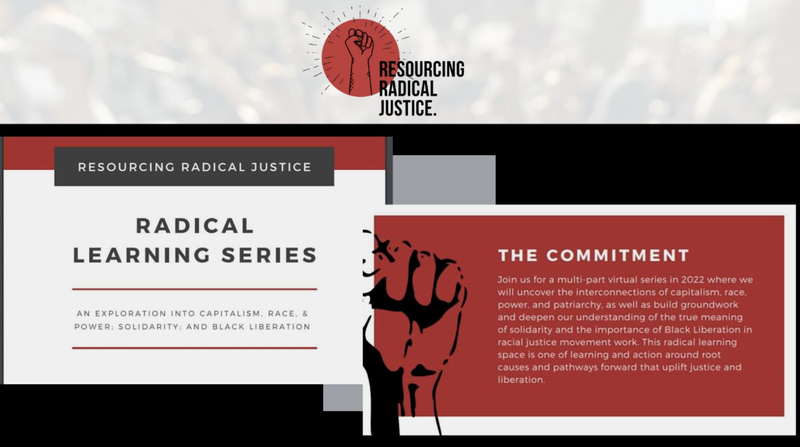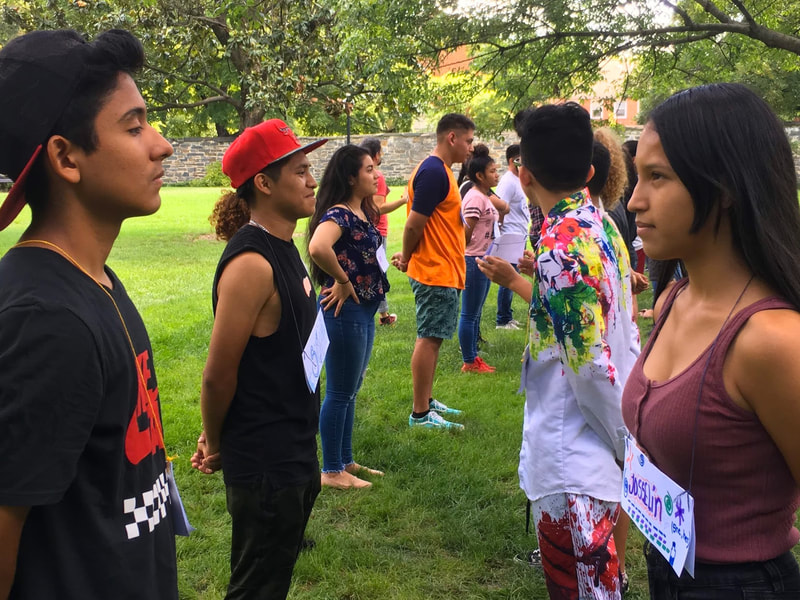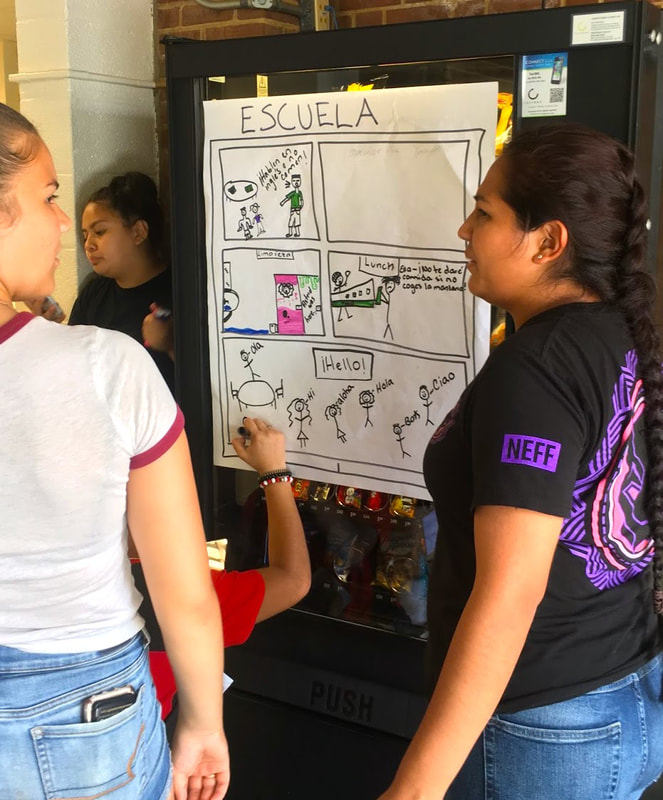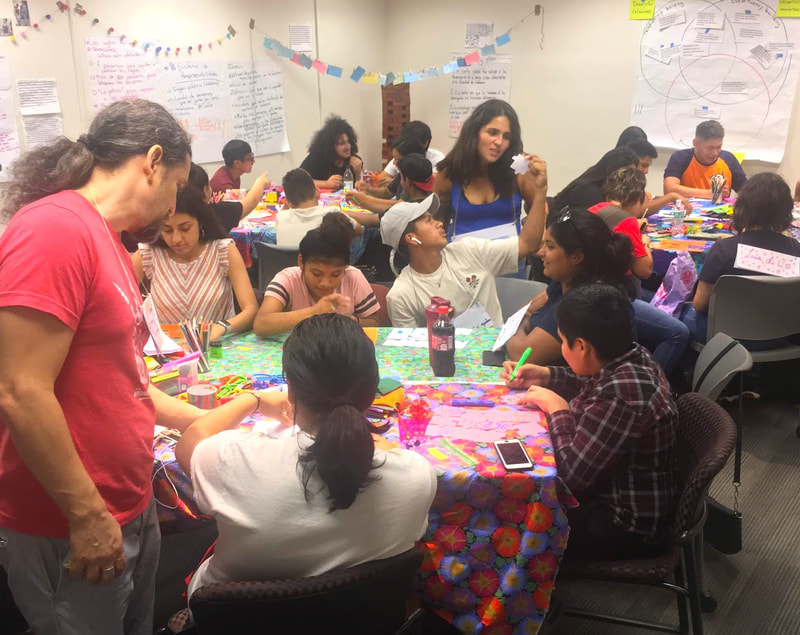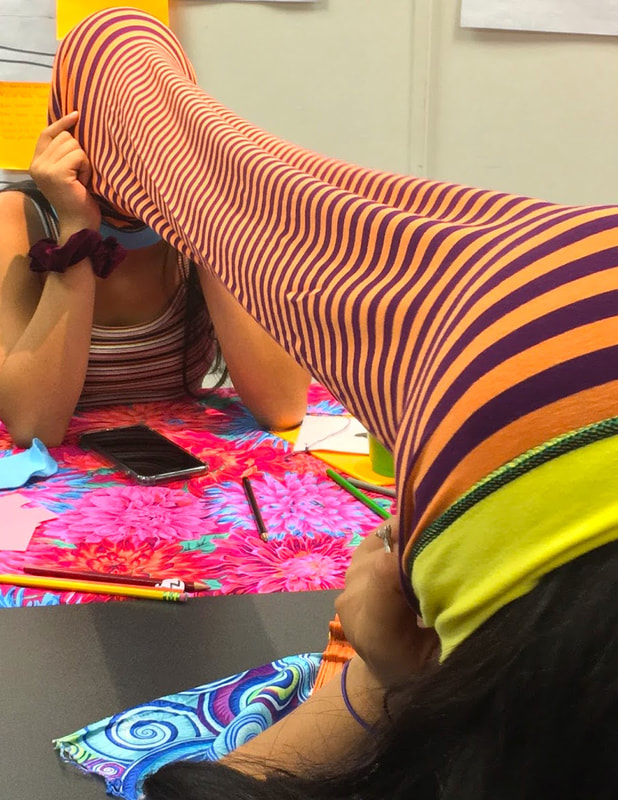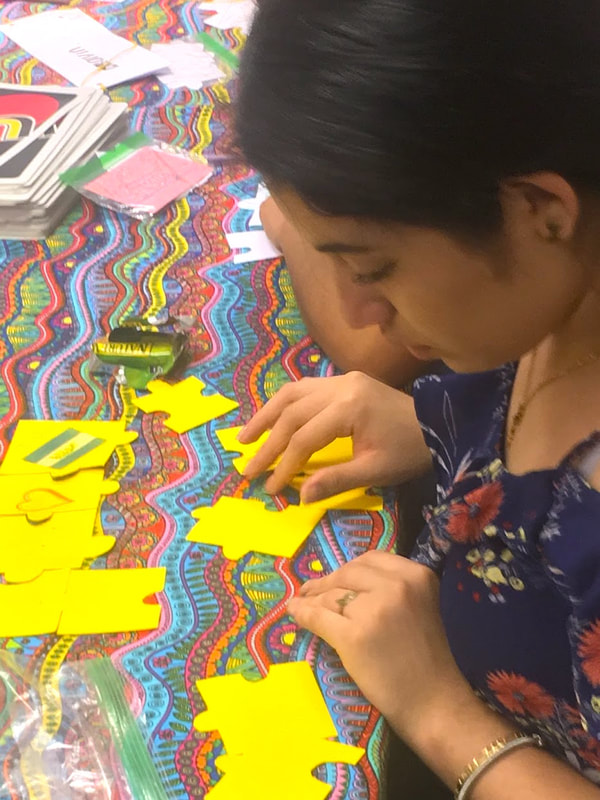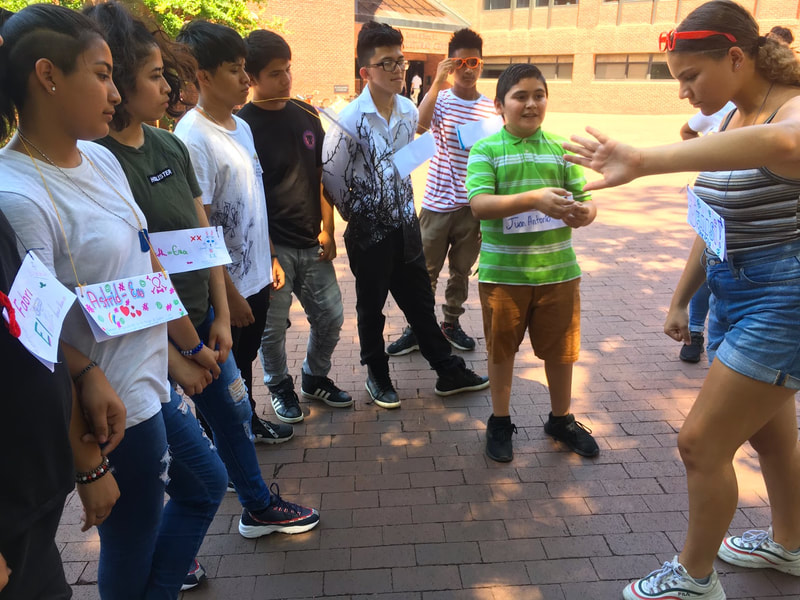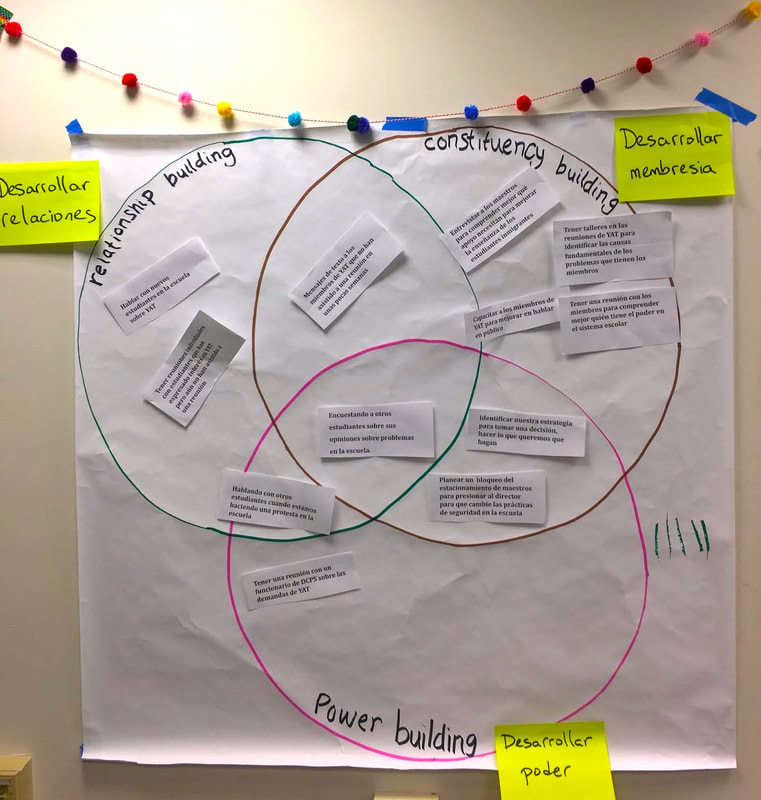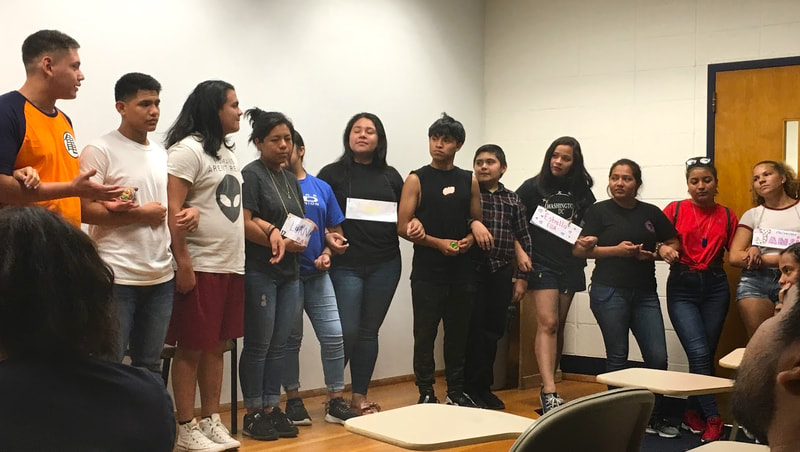|
Providing support and accompaniment to organizers and community workers is a critical part of the way Movement Matters supports our collective struggle for justice. However, we recognize that those working on the ground are only part of the movement ecosystem. We are also excited when the opportunity presents itself to accompany funders who are interested in supporting transformative work. Over the last two years, Movement Matters has been partnering with Resourcing Radical Justice (RRJ), a funders collective that centers Black liberation as the path to a thriving Greater Washington region by advocating for philanthropic sector transformation, coordinating capacity building for and funding to Black and POC-led grassroots organizers, and building, lifting up, and learning from radical organizers. Our Movement Matters team played two distinct roles in RRJ’s Radical Learning Series process: helping to structure and ground the development of a learning cohort and providing content training to the cohort once it had been developed. RRJ drew on our expertise in creating values-driven, body-and-mind centered processes to help them envision the arc of their cohort design―from the application process to the learning modules to the post-workshop integration of knowledge, skills, and values. Those doing “professional” training for funders often overlook the need to allow participants to connect to their bodies, minds, and spirits as they navigate systems that may resist change. We provided concrete ways for RRJ to utilize arts and culture to avoid these traps and help participants deeply connect to new ways of thinking about funding and to navigate (personally and professionally) the obstacles they might face in implementing new approaches within their organizations. In addition to this overall framing, Movement Matters also designed and ran two training modules within the RRJ curriculum. These modules focused on understanding how philanthropy can both support and hinder movement work for systems change and racial justice, both in terms of what they fund and how they fund it. We drew on our deep knowledge of various philanthropic efforts to support community organizing, racial equity and systems change work in the DC area over the last 25 years in crafting the training content. We helped RRJ cohort members critically reflect on and ground themselves in philanthropic practices that contribute more consistently and meaningfully to a healthy movement ecosystem. As always, these workshops were deeply rooted in Movement Matters’ popular education approach and resonated strongly with the RRJ cohort. Helping those who organize money to be aligned with movement organizing in their vision, values, and practice is a critical part of a multi-pronged approach to creating change. We were happy to be able to partner with RRJ to do this kind of transformational work with funders in the region. Connect with us for more information on MM's Funder Training and Technical Assistance . Movement Matters is based in Washington, DC. We work regionally with various communities and with national partners. We are thrilled to announce our partnership with the Indigenous Environmental Network (IEN) to develop popular education curricula for IEN's Indigenous Principles of Just Transition and support in the building of their Just Transition Program. IEN’s principles capture key elements about our relationship to Mother Earth, the immutable importance of Indigenous sovereignty, and the critical role of Indigenous knowledge in transitioning from an exploitative economy to one that fosters life and harmony. We cannot undo the harm we have done to the planet without addressing the destruction of settler colonialism. Climate justice cannot be achieved without centering Indigenous solutions and recognizing Indigenous sovereignty. We are excited to partner with IEN on this significant project! For more information on MM's Curriculum Development or Popular Education expertise, connect with us. Movement Matters is based in Washington, DC. We work regionally with various communities and with national partners. This past Summer 2019, Movement Matters created and facilitated a weeklong Community Organizing Institute for Latinx immigrant youth in the DC area. Training youth is different than training staff organizers. It engages us differently, challenges us, offers new perspectives on our work, and keeps us on our toes. Flexibility and responsiveness became key parts of the week. The Youth Organizing Institute allowed us the opportunity to deepen our use of arts and theater/movement based activities to engage young people in deep reflection on the issues they face in their schools, jobs, and community. We explored power dynamics and how they are used to reinforce the status quo. We grappled with the role of race in creating divisions among youth, as well as common experiences that could be built upon. In each of these discussions, we integrated the need for structural change. And in order to create this change, the need for a strong youth voice, for cohesive relationships, for bold action, for organizing. There is much work that is still to be done. The deep conversations throughout the week meant we spent less time than we anticipated on some of the core organizing skills we hoped to cover. We touched on the need for relationship building, but didn’t get to practice some of the essentials of outreach and one-on-ones. We talked about the need to challenge power, but only touched on the tools for conducting target analysis and building strategic campaigns. These became the guideposts for our current work, not just in trainings with Movement Matters, but in our ongoing engagement with the organizations that brought youth to the Institute. These organizations included CASA de Maryland, the Latino Youth Leadership Council, and Many Languages One Voice. It was truly exciting to bring youth from various organizations across the region together to ground themselves in a common experience, build relationships of action, and begin to envision a broader immigrant youth movement in the DMV—especially at this urgent moment. Through our ongoing work with these groups, and our partnership with the Meyer Foundation to expand the number of organizations focusing on youth voice and power, we are excited to continue to build knowledge and commitment to youth organizing. We plan to build on this process and expand the circle of organizations and young people learning and creating change together. Movement Matters is currently scheduled to conduct a 4-day Youth Organizing Institute in Long Island, New York this April 2020. " My experience at the Movement Matters Youth Organizing Institute was transformational and completely eye opening. I am a person that likes to see things form different perspectives and this Institute provided me and my peers with different perspectives on how to view systemic change and most importantly how to move and embrace our people towards systemic change"
Rosa Avila, 2019 Youth Organizing Institute Participant. For more information, visit our Organizing Institutes webpage or connect with us.
Movement Matters is based in Washington, DC. We work regionally with various communities and with national partners. |
AuthorsMOVEMENT MATTERS Archives
October 2023
Categories
All
|
